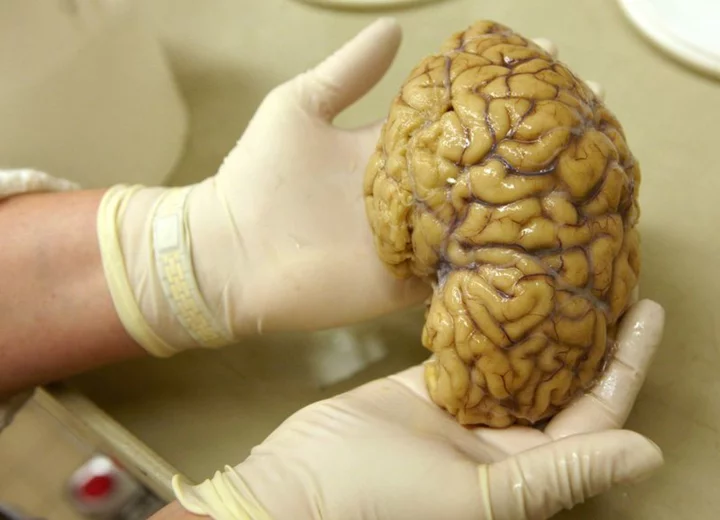
Brexit: 'Call us' on trade, says German finance minister Christian Lindner
In a BBC interview, Christian Lindner invites the UK to discuss a closer relationship with the EU.
2023-10-14 07:24

Ambitious research yields new atlas of human brain cells
By Will Dunham WASHINGTON Examining the human brain at the cellular level in more detail than ever before,
2023-10-13 02:19

Why Do Airplanes Feel Like They’re Moving So Slowly?
You know planes cover hundreds of miles per hour. So why doesn't it look like they do?
2023-10-12 21:15

8 Victorian Scientists Who Investigated Ghosts
Some 19th-century scientists embraced psychical research, while others tried to debunk the sensational stories.
2023-10-11 02:29

Running could be just as effective at treating depression as medication, scientists find
Running could be just as effective at treating depression as medication, a breakthrough study has suggested in findings that could radically alter the way patients are treated. Researchers also found that running showed more benefits to an individual’s physical health than antidepressants, which had a slightly negative effect over time. Despite this, the study found that adherence to running was lower than to medication, meaning more participants found it easier to follow a medical protocol than a fitness regime. The study compared the effects of antidepressants with running for anxiety, depression, and overall health in over 140 patients. The research found that while both have the same benefits for mental health, a 16-week course of running over the same period scored higher in terms of physical health improvement, whereas antidepressants lead to a slightly worse physical condition. Scientists, including Brenda Penninx from VU, also found that the drop-out rate was much higher in the group that initially chose exercise. In the study, patients were offered a choice of treatment of either antidepressants for 16 weeks, or group-based running therapy for 16 weeks. Forty-five of the participants chose antidepressants while 96 participated in running that included aiming for two to three closely supervised 45-minute group sessions per week for the same period. Researchers say members of the group who chose antidepressants were slightly more depressed than the members of the group that chose to take running. “This study gave anxious and depressed people a real-life choice, medication or exercise. Interestingly, the majority opted for exercise, which led to the numbers in the running group being larger than in the medication group,” Dr Penninx said. Antidepressant treatment required patients to adhere to their prescribed medication, and was not found to directly impact daily behaviors. However, exercise was found to also address sedentary lifestyles often found in patients with depressive and anxiety disorders by encouraging them to go outside, set personal goals, improve their fitness, and participate in a group activity. But researchers also found that adherence to protocol was lower in the running group than in the antidepressant group, despite the initial preference for running over antidepressants. While at the end of the trial, about half the number of participants in both groups showed improvement in depression and anxiety, the running group also had improvements in physical health markers like blood pressure, heart function, and weight. The antidepressant group, on the other hand, showed slight deterioration in these metabolic markers, the study noted. “Antidepressants generally had a worse impact on body weight, heart rate variability, and blood pressure, whereas running therapy led to improved effects on general fitness and heart rate for instance,” Dr Penninx said. While antidepressants have been found to be safe and effective, working for most people, scientists call for extending the treatment arsenal by implementing exercise therapy. “Telling patients to go run is not enough. Changing physical activity behavior will require adequate supervision and encouragement as we did by implementing exercise therapy in a mental health care institution,” Dr Pennix added. Read More Postnatal depression drug ‘shows benefits five years on’ John Fetterman wants people to stop fussing about his use of captioning technology Mental health ‘top reason for children contacting Childline’ Largest study of centenarian blood reveals secrets to longevity Scientists map where 27 different types of love are felt in the body Biggest ever solar storm identified using ancient tree rings
2023-10-10 17:28

Largest study of centenarian blood reveals secrets to longevity
Centenarians tend to have lower levels of glucose, creatinine and uric acid from their sixties onwards, according to the largest study of its kind that may lead to a simple blood test to predict a person’s chance of reaching 100. The research, published on Monday in the journal GeroScience, is the biggest to date to measure and follow up the levels of different molecules in the blood of people born between 1893 and 1920. Scientists, including those from Karolinska Institutet, assessed the data on blood molecules from over 44,500 Swedes who underwent clinical testing between 1985 and 1996 and followed up till 2020. They focused specifically on people born between 1893 and 1920, who were between 64 and 99 years old when their blood samples were first tested, and followed them up as they grew closer to 100 years of age. About 1,200 individuals in the study, or about 2.7 per cent of the participants, reached 100. Researchers compared this subset’s data with those of their peers who were younger than them. The analysis found 12 blood-based molecules associated with metabolism, inflammation as well as liver and kidney function, that were also linked to ageing or mortality in previous studies. These molecules included total cholesterol and glucose as markers of metabolism, uric acid indicating inflammation levels, enzymes indicative of liver health and creatinine as a measure of kidney health. Researchers also looked at albumin and iron levels in the blood. Except for a liver enzyme and albumin, all other molecules were found linked to the likelihood of a person becoming a centenarian. Those with increased levels of total cholesterol and iron had a greater likelihood of becoming centenarians compared to those with lower levels. However, for molecules including glucose, creatinine, uric acid, and liver enzymes, lower levels were associated with higher chances of living past 100. “We found that, on the whole, those who made it to their hundredth birthday tended to have lower levels of glucose, creatinine and uric acid from their sixties onwards,” researchers wrote in The Conversation. “Very few of the centenarians had a glucose level above 6.5 earlier in life, or a creatinine level above 125,” they said. While the differences found in the study between groups were small in some cases, researchers said the findings still suggest a “potential link” between metabolism, nutrition and longevity. However, the study falls short of recommending lifestyle factors or genes responsible for these blood molecule levels. “While chance likely plays a role for reaching age 100, the differences in biomarker values more than one decade prior death suggest that genetic and/or lifestyle factors, reflected in these biomarker levels may also play a role for exceptional longevity,” scientists wrote in the study. “However, it is reasonable to think that factors such as nutrition and alcohol intake play a role. Keeping track of your kidney and liver values, as well as glucose and uric acid as you get older, is probably not a bad idea,” they said. Read More Good financial planning could increase life expectancy, study suggests Scientists find gene that grants long life – and successfully test it on another species Scientists extend mice lives by connecting their blood to young ones
2023-10-10 13:21

Audio Invasion: How the Theremin Went From Soviet Labs to Hollywood
The theremin—a spooky instrument that scored the biggest sci-fi films of the 1950s—was invented by accident.
2023-10-10 03:21

New tests confirm antiquity of ancient human footprints in New Mexico
By Will Dunham WASHINGTON Humans trod the landscape of North America thousands of years earlier than previously thought,
2023-10-06 15:52

Bummer: A Brain-Infesting Worm in Rats Can Also Attack Humans
The CDC is giving people a very good reason to wash their produce.
2023-09-30 05:29

DNA remnants found in fossil of 6 million year old turtle
Remnants of DNA have been discovered in fossilized remains dating to 6 million years ago of a sea
2023-09-29 01:55

Right again, Einstein! Study shows how antimatter responds to gravity
By Will Dunham In the world of "Star Trek," the starship Enterprise zips through space using a warp
2023-09-27 23:18

Scientists discover strange 'mathematical pattern' in the human body
The human body is a marvel of science and researchers have discovered a strange reoccurring mathematical pattern within its cells. Our bodies are made up of a massive variety of individual cells with countless different functions, from neurons in our nervous system to the oxygen carriers that all work in harmony to keep us alive. Experts from scientific research institutions in Germany, Canada, Spain, and the US have worked together on a study to determine just how many cells of each type there are in the human body and the results are staggering. They found that most adult males possess around 36 trillion cells, while adult females have in the region of 28 trillion cells. For a 10-year-old child, they have around 17 trillion. Interestingly though, scientists discovered that, regardless of the total number of cells, if they are grouped according to their function, the proportions for each individual remain the same. The researchers explained in their findings: “These patterns are suggestive of a whole-organism trade-off between cell size and count and imply the existence of cell-size homeostasis across cell types.” Scientists believe there is a natural balancing act at play between different cell types with new cells being produced to maintain the balance. The body produces fewer larger cells (such as muscle fibres) and more smaller cells (like blood cells). It is hoped that future studies will be able to uncover exactly how this happens and how bodies seem to naturally regulate cells. They explained that all cells are perfectly sized for their roles and any deviation from their scale can indicate the presence of disease. Experts have made their data, analysis and results public in the hopes that future studies into biology will be able to utilise their research. Sign up to our free Indy100 weekly newsletter Have your say in our news democracy. Click the upvote icon at the top of the page to help raise this article through the indy100 rankings.
2023-09-22 23:15
